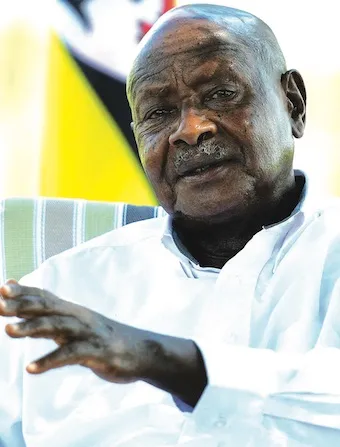TOP STORY | Museveni Admits: “Corruption Has Reached State House” in Stunning Revelation
Kampala, Uganda – August 14, 2025
In an extraordinary and unusually frank admission, President Yoweri Museveni has acknowledged that corruption has infiltrated the highest levels of his administration — including State House itself.
Speaking over the weekend at State House, Uganda’s long-serving leader revealed that citizens were paying up to UGX 30 million simply to have their letters seen by him. The remarks, rare in their candour, have ignited fresh debate over systemic corruption, state failure, and the credibility of Uganda’s anti-graft fight.
“Corruption has even reached the State House. People were paying up to Shs 30 million just to ensure I saw a letter,” Museveni said, visibly frustrated.
The president described a disturbing scheme: desperate Ugandans—seeking jobs, justice, or relief—were forced to pay middlemen operating within State House itself. Though he claimed that some letters did eventually reach him and were acted upon, the transactional nature of access to the presidency was laid bare.
“The System Is Dead, Clogged with Parasites”
Museveni did not hold back. He labeled the public sector “dead” and “filled with parasites,” admitting that even Uganda’s internal security officers—tasked with frontline intelligence—were no longer trusted by citizens.
“People had information but couldn’t find anyone trustworthy. So, they bypassed GISOs and DISOs and went straight to my daughters,” he said.
According to Museveni, whistleblowers approached Marcella Karekye, a media aide and his daughter, who then passed the information to his eldest daughter, Natasha Karugire.
“Imagine that! They couldn’t trust your systems, so they found my daughter. Natasha became the ‘Director General of Intelligence’ because the system is dead,” he said.
A Damning Portrait of a Hollowed-Out State
The president’s comments paint a damning picture of a government long accused of institutional rot. Uganda loses over UGX 10 trillion annually to corruption, according to the Inspectorate of Government, and ranks 140 out of 180 countries on Transparency International’s 2024 Corruption Perceptions Index.
Behind these figures lie failing hospitals, schools without resources, and vital infrastructure projects stalled by graft. For many Ugandans, Museveni’s admission was not a revelation, but a confirmation of the reality they face daily: public services are bought, not guaranteed.
Critics: “Museveni Is the Architect of This System”
While some praised the president’s honesty, many critics viewed the confession as deeply hypocritical.
“Museveni built this corruption machine,” said Godber Tumushabe of the Great Lakes Institute for Strategic Studies. “He rigs everything—the rules, the processes, the votes. This is not about one rotten office. It’s a governance model.”
Veteran constitutional lawyer Peter Walubiri was even more scathing:
“Without corruption, Museveni’s regime cannot survive. He uses bribery to control MPs, co-opt opponents, and secure contracts. Fighting corruption would be political suicide for him.”
Both analysts dismissed Museveni’s remarks as performative, timed to appease public anger ahead of the 2026 elections.
Supporters See a “First Step”
Within the ruling National Resistance Movement (NRM), however, the tone was more forgiving.
“Even Jesus was betrayed for money,” said Emmanuel Dombo, NRM’s director of Information. “Corruption is a human problem, not just an NRM problem. The president’s actions show commitment to fighting it.”
Dombo praised the arrests that have followed Museveni’s remarks and called for enforcement agencies to follow through with investigations.
Yet, as of now, no one has been prosecuted for the very crimes the president described. And while Museveni referenced arrests, he provided no names, dates, or further details.
Anti-Corruption Groups: “The System Is Broken”
For groups like the Anti-Corruption Coalition Uganda, the president’s statement is as much an admission of failure as a call to action.
“If even State House is compromised, what hope is there for the rest of the country?” asked Marlon Agaba, the group’s executive director.
Agaba noted that citizens already believe that bribery is the price of doing business with the state—whether it’s registering land, renewing a licence, or accessing justice.
“Museveni gets daily intelligence briefings. For him to express shock now is not believable. He’s describing a system he has overseen for decades,” Agaba added.
More Talk, or a Turning Point?
The president’s critics remain deeply skeptical. In past election cycles, Museveni has made similar declarations—vowing to “deal with the corrupt,” only for the most egregious offenders to remain untouched.
“If he’s serious, reform means dismantling patronage networks, empowering independent institutions, and prosecuting people close to him,” said Tumushabe. “Anything less is just more political theatre.”
What Comes Next?
Museveni’s blunt admission—“the system is dead”—may resonate with frustrated citizens, but the road to genuine reform is steep. It would require more than speeches: it demands political will, institutional courage, and a willingness to challenge the very structures that have kept him in power for nearly four decades.
Until then, the rot Museveni described at State House remains a symbol of a wider decay—one that stretches from the presidency to the smallest village council.
RELATED:
- [Uganda’s UGX 10 Trillion Graft Hole: Where Does the Money Go?]
- [From State House to Local Councils: How Corruption Shapes Everyday Life]
- [Can the Anti-Corruption Unit Succeed Where IG Has Failed?]
